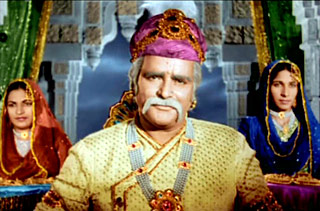"The show must go on"- a principle Prithviraj Kapoor adhered to throughout his life. By far Prithviraj Kapoor was one of the best looking actors in 1930s. Born on 3rd November 1906 he spent his early years at Peshawar. Little did he know then one day the biggest film family in Bollywood would be of his lineage.
He shifted to Mumbai from Peshawar, now in Pakistan. Here he joined the Imperial Film Company and appeared in various films like Cinema Girl (1930). He was also the part of Alam Ara (1931). He also joined Grant Anderson Theatre Company performing Shakespeare in English. In 1933 he got associated with New Theatres, Kolkata. This association completely changed his career. He started with Rajrani Meera (1933) and went onto be a part of films such as, Manzil (1936), President (1937) and Vidyapathi (1937). The latter is a memorable film of Prithviraj Kapoor`s career.
After this Prithviraj Kapoor teamed up with Chandulal Shah for Ranjit Movietone and remained associated with it from 1938 - 1940. His best known film during this time was Pagal (1940). In this movie he portrayed the role of a psychotic doctor in a mental asylum. It was in a way an anti hero role where he is deceived and married off to the less beautiful of two sisters. Enraged he injects the one he wanted to marry with a medicine that made her mad. He kept her in the asylum and further tortured her.
But it was Sohrab Modi`s Sikandar (1941) for which Prithviraj Kapoor he is still remembered. With is kind of built, looks, voice and personality he was just perfect as Sikandar or Alexander, the great. The film was set in 326 BC when Alexander the Great arrived at Indian border at Jhelum and faced Porus (Sohrab Modi) who tries to stop him. The lavish sets and incredible battle scenes were widely appreciated. Its striking, rhetorical dialogues gave both Prithviraj Kapoor and Sohrab Modi free reign to their histrionic skills. Even today it is considered a masterpiece in the Indian cinema. Sikandar took Prithviraj Kapoor to dizzying heights.
 Prithviraj Kapoor was now considered for royal and elite roles. In future too he was unforgettable in the role of Akbar in Mughal-e-Azam (1960). This legendary actor had always been linked to theatre. Prithviraj Kapoor`s love for theatre led to the establishment of Prithvi Theatre in 1944. He was the first person to set up a professional theatre in India. Prithvi Theatre competed 16 years under the supervision of Prithviraj Kapoor. During this span it conducted around 2,662 shows. In each of these shows he played the protagonist. Even when he was running high fever Prithviraj Kapoor showed up on stage to ensure that the show went on. Some of Prithviraj Kapoor`s play are Deewaar, Pathan (1947), Gaddar (1948) and Paisa (1954) and others. Prithviraj Kapoor also introduced new talents through his theatres, such as, Ramanand Sagar, Shankar-Jaikishen and Ram Ganguly.
Prithviraj Kapoor was now considered for royal and elite roles. In future too he was unforgettable in the role of Akbar in Mughal-e-Azam (1960). This legendary actor had always been linked to theatre. Prithviraj Kapoor`s love for theatre led to the establishment of Prithvi Theatre in 1944. He was the first person to set up a professional theatre in India. Prithvi Theatre competed 16 years under the supervision of Prithviraj Kapoor. During this span it conducted around 2,662 shows. In each of these shows he played the protagonist. Even when he was running high fever Prithviraj Kapoor showed up on stage to ensure that the show went on. Some of Prithviraj Kapoor`s play are Deewaar, Pathan (1947), Gaddar (1948) and Paisa (1954) and others. Prithviraj Kapoor also introduced new talents through his theatres, such as, Ramanand Sagar, Shankar-Jaikishen and Ram Ganguly.
In 1965 Prithviraj Kapoor delivered a memorable performance in Aasmaan Mahal. Here he enacted the role of an aged Nawab who refuses to give up his mansion to the capitalists who would turn it into a hotel. The film won accolades at International Film Festivals. His later films include Teen Bahuraniyan (1968), Kal Aaj Aur Kal (1971) and a Punjabi film, Nanak Naam Jahaaz Hai (1969).
Some of his other memorable films were:
| Alam Ara (1931) | Ishara (1943) | Anandmath (1952) | Rustom Sohrab (1963) |
| Pagal (1940) | Phool (1944) | Ehsan (1954) | Jahan Ara (1964) |
| Sikandar (1941) | Dahej (1950) | Pardesi (1957) | Rajkumar (1964) |
| Raj Nartaki (1941) | Awaara (1951) | Mughal-e-Azam (1960) | Janwar (1965) |






